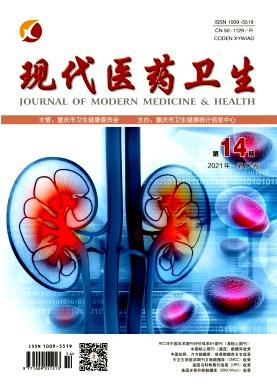Analysis of the psychological state and influencing factors of college students returning to Guangzhou University City during the outbreak of COVID-19.
引用次数: 0
Abstract
Objective To investigate the knowledge awareness and psychological status of college students returning to school during the outbreak of COVID-19,analyze the relevant influencing factors,and provide reference for the formulation of psychological intervention measures.Methods From May 14 to 17, 2020,a questionnaire survey was conducted on the 728 students which approved return ingress of a medical university in Guangdong University using the Psychological Questionnaire for Sudden Public Health Events (PQEEPH) and analyzed by SPSS19.0 software.Results A total of 728 university students were approved for returning to school,of whom 33.24%(242/728) were boys,66.76%(486/728) were women,60.30% (439/728) were in undergraduate studies and 39.70%(289/728) were in graduate school.The six aspects of personal preventive measures for COVID-19 accounted for 97.8%,Only 9.89%t of patients with COVID-19 were known to have the three main manifestations.The dimension scored by the PQEEPH scale from high to low:fear [(1.75±0.51)scores],nervous breakdown [(1.34±0.44)scores],depression [(1.28±0.42) scores],suspect [(1.25±0.39)scores],compulsion-anxiety [(1.13±0.30)scores];Relatively heavy;those who did not return to school and did not determine the time of return were more likely to be ill;those who lived with a family generally or poorly,who did not know whether the community where they lived had found new crown cases,had a higher level of depression,nervous breakdown,compulsive-anxiety;depression,nervous breakdown,fear,compulsion anxiety and suspecting were relatively severe in the five dimensions of those who expressed difficulty in controlling their emotions and those who expressed stress and anxiety.Conclusion The college students who have been approved to return to school lack a comprehensive grasp of the knowledge of COVID-19,and their psychological state is influenced by many factors,and should formulate targeted educational and psychological interventions to improve the knowledge of COVID-19,reduce or even avoid the occurrence of bad emotions. (English) [ABSTRACT FROM AUTHOR] 目的 调查新型冠状病毒肺炎(COVID-19)疫情期间返校大学生COVID-19相关知识知晓与 心理状况,分析相关影响因素,为制定心理干预措施提供参考。方法 2020年5月14-17日采用突发性公共 卫生事件心理问卷(PQEEPH)对广州某医科大学已批准返校的728名大学生进行问卷调查,采用SPSS19.0统 计软件进行分析。结果 728名大学生中男生占33.24%(242/728),女生占66.76%(486/728);在读本科生占 60.30%(439/728),在读硕士研究生占39.70%(289/728)。知晓COVID-19个人预防措施的6个方面内容者 占97.8%,知晓COVID-19患者的3个主要表现者仅占9.89%。突发性公共卫生事件心理问卷各维度评分由 高至低依次为恐惧[(1.75±0.51)分]、神经衰弱[(1.34±0.44)分]、抑郁[(1.28±0.42)分]、疑病[(1.25± 0.39)分]、强迫-焦虑[(1.13±0.30)分]。未返校且未确定返校时间者疑病状况较重;与一同居住的家人关系一 般或较差者、不知道所居住小区是否发现过COVID-19病例者抑郁、神经衰弱、强迫-焦虑状况较重;表示控制自 己情绪非常困难者和表示生活状态为紧张担心者抑郁、神经衰弱、恐惧、强迫焦虑、疑病5个维度的状况均相对 较重。结论 返校大学生对COVID-19相关知识缺乏全面掌握,其心理状态受多方面因素的影响,应制定针对 性宣教与心理干预措施,在提高COVID-19相关知识知晓率的同时降低不良情绪发生率。 (Chinese) [ABSTRACT FROM AUTHOR] Copyright of Journal of Modern Medicine & Health is the property of Journal of Modern Medicine & Health and its content may not be copied or emailed to multiple sites or posted to a listserv without the copyright holder's express written permission. However, users may print, download, or email articles for individual use. This abstract may be abridged. No warranty is given about the accuracy of the copy. Users should refer to the original published version of the material for the full abstract. (Copyright applies to all Abstracts.)新冠肺炎疫情期间广州大学城返校大学生心理状态及影响因素分析
目的了解新冠肺炎疫情期间大学生返校知识意识及心理状况,分析相关影响因素,为制定心理干预措施提供参考。方法于2020年5月14日至17日,采用突发公共卫生事件心理问卷(PQEEPH)对广东大学某医科院校728名批准返校的学生进行问卷调查,并采用SPSS19.0软件进行分析。结果批准复学的在校大学生728人,其中男生占33.24%(242/728),女生占66.76%(486/728),本科占60.30%(439/728),研究生占39.70%(289/728)。个人COVID-19预防措施的6个方面占97.8%,仅9.89%的COVID-19患者已知有3个主要表现。PQEEPH量表的维度得分从高到低:恐惧[得分(1.75±0.51)],神经衰弱(得分(1.34±0.44)),抑郁得分(1.28±0.42),怀疑[得分(1.25±0.39)],compulsion-anxiety[得分(1.13±0.30)];相对较大;那些没有回到学校,不确定返回的时间更有可能生病,那些住在一起的家庭一般或差,社区不知道住在哪里找到了新皇冠的情况下,有一个更高层次的抑郁、精神崩溃、强迫焦虑、抑郁、精神崩溃、恐惧、强迫焦虑、怀疑在表达情绪控制困难和表达压力、焦虑的5个维度上相对严重。结论已批准返校的大学生对新冠肺炎相关知识掌握不全面,心理状态受多种因素影响,应制定有针对性的教育和心理干预措施,提高新冠肺炎相关知识,减少甚至避免不良情绪的发生。从作者(英文)[摘要]目的调查新型冠状病毒肺炎(COVID-19)疫情期间返校大学生COVID-19相关知识知晓与心理状况,分析相关影响因素,为制定心理干预措施提供参考。方法2020年5月14 - 17日采用突发性公共卫生事件心理问卷(PQEEPH)对广州某医科大学已批准返校的728名大学生进行问卷调查,采用SPSS19.0统计软件进行分析。结果728名大学生中男生占33.24%(242/728),女生占66.76%(486/728);在读本科生占60.30%(439/728),在读硕士研究生占39.70%(289/728)。知晓COVID-19个人预防措施的6个方面内容者占97.8%,知晓COVID-19患者的3个主要表现者仅占9.89%。突发性公共卫生事件心理问卷各维度评分由高至低依次为恐惧(1.75±0.51)分,神经衰弱(1.34±0.44)分,抑郁(1.28±0.42)分,疑病(1.25±0.39)分,强迫-焦虑[(1.13±0.30)分]。未返校且未确定返校时间者疑病状况较重,与一同居住的家人关系一般或较差者,不知道所居住小区是否发现过COVID-19病例者抑郁,神经衰弱,强迫-焦虑状况较重;表示控制自己情绪非常困难者和表示生活状态为紧张担心者抑郁,神经衰弱,恐惧,强迫焦虑,疑病5个维度的状况均相对较重。结论返校大学生对COVID-19相关知识缺乏全面掌握,其心理状态受多方面因素的影响,应制定针对性宣教与心理干预措施,在提高COVID-19相关知识知晓率的同时降低不良情绪发生率。【摘要】《现代医学与健康杂志》版权归《现代医学与健康杂志》所有,未经版权所有人书面许可,其内容不得被复制、通过电子邮件发送到多个网站或发布到某个列表服务器。但是,用户可以打印、下载或通过电子邮件发送文章供个人使用。这篇摘要可以删节。对副本的准确性不作任何保证。用户应参考资料的原始出版版本以获取完整摘要。(版权适用于所有摘要。)
本文章由计算机程序翻译,如有差异,请以英文原文为准。
求助全文
约1分钟内获得全文
求助全文

 求助内容:
求助内容: 应助结果提醒方式:
应助结果提醒方式:


